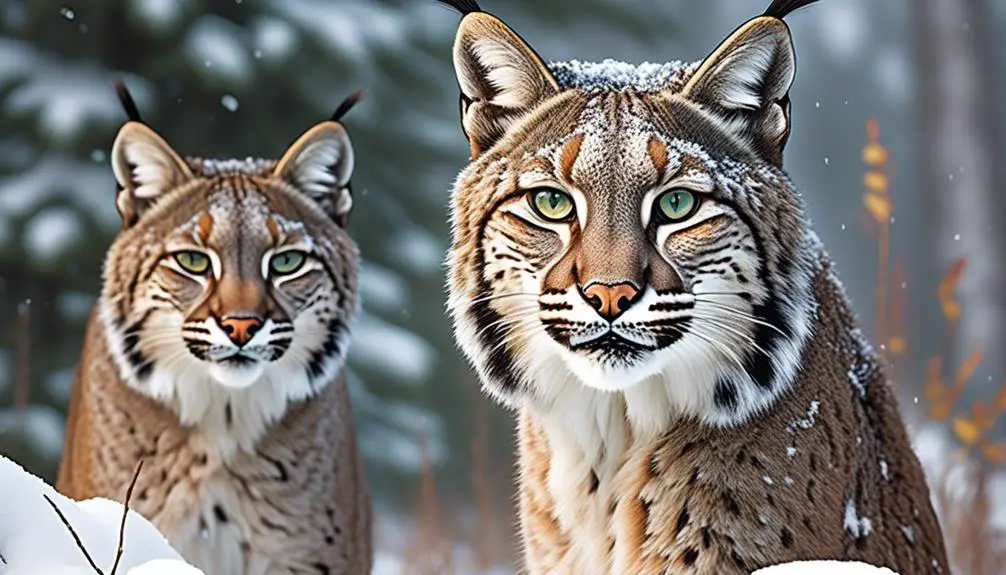Curiosity piqued? Prepare to embark on a captivating voyage into the captivating world of Michigan’s wild cats.
From the enchanting Canada Lynx to the stealthy Bobcat and the awe-inspiring Cougar, these magnificent felines hold the key to unraveling the mysteries of Michigan’s diverse ecosystem.
But there’s more to these creatures than meets the eye. Immerse yourself in the secrets of their lifespans, sizes, and habitats, while uncovering the challenges they face.
Stay tuned as we reveal essential tips for encounters and the vital role citizen involvement plays in their conservation.
Prepare to be enthralled as we unveil the astounding world of wild cats in Michigan.
Canada Lynx: Endangered Wild Cat in Michigan
Are you curious about the status of Canada Lynx, an endangered wild cat species in Michigan?
The Canada Lynx, with a lifespan of 10-20 years, is a medium-sized wild cat measuring 2.5-3.5 feet in length. This species was declared endangered in 2000 due to over-trapping, habitat loss, and the impacts of global warming.
Sightings of the Canada Lynx in Michigan are rare, with their presence primarily concentrated around Isle Royale. Michigan State University has reported sightings of this elusive cat since 2003.
In contrast to the Canada Lynx, the Bobcat is a smaller wild cat found in Michigan. With a lifespan of 7 years and a length of 19-49 inches, these spotted brown cats are skilled climbers and runners, capable of reaching speeds of up to 30 miles per hour. Unfortunately, the population of Bobcats in the upper peninsula of Michigan has been decreasing.
As for the Cougar, also known as the mountain lion, it has a lifespan of 8-13 years and measures 6.7-7.9 feet in length. While there were confirmed sightings in 2008, it’s believed that Cougars no longer occupy Michigan.
If you ever encounter a wild cat, it’s important to stay calm. Running may trigger the cat’s predatory instincts, so slowly pick up children or pets without sudden movements. Seek safety by slowly backing towards a building or car. Make yourself uninteresting and unthreatening by waving your hands over your head to appear larger and making loud, low shouts to scare the cat off. Avoid aggressive behavior and fight back if necessary.
If you spot a wild cat in Michigan, reporting the sighting is crucial. It contributes to the knowledge of wild cat populations and aids in conservation efforts. When reporting, provide accurate details such as the location, date, and any supporting evidence. This helps ensure public safety and allows authorities to monitor wild cat activities. By working together, we can protect Michigan’s wildlife and encourage responsible coexistence with wild cats.
Bobcat: Skilled Climber and Runner in Michigan
The Bobcat, a smaller wild cat species found in Michigan, showcases impressive skills as a climber and runner. With a lifespan of around 7 years and a length ranging from 19 to 49 inches, these spotted brown cats are smaller than their counterpart, the Canada Lynx. Bobcats are skilled climbers, able to navigate trees with ease using their sharp retractable claws. They are also remarkable runners, reaching speeds of up to 30 miles per hour.
Their population in the upper peninsula of Michigan has seen a decrease in recent years. It is believed that habitat loss and changes in prey availability may be contributing factors. Despite this decline, bobcats can still be found in various regions of Michigan, especially in areas with dense forests and ample cover.
To further understand the characteristics of the Bobcat, let’s take a closer look at their attributes in the table below:
| Attribute | Description |
|---|---|
| Lifespan | 7 years |
| Length | 19–49 inches |
| Climbing Skills | Excellent |
| Running Speed | Up to 30 miles per hour |
| Population Trend | Decreasing in the upper peninsula |
| Preferred Habitat | Dense forests with ample cover |
| Prey | Small mammals, birds, and reptiles |
| Conservation Status | Least Concern (IUCN) |
Cougar: Elusive Mountain Lion in Michigan
The Cougar, also known as the elusive mountain lion, is a fascinating wild cat species that can be found in Michigan. Cougars have a lifespan of 8 to 13 years and can reach lengths of 6.7 to 7.9 feet. They’re strong and solitary creatures, known for their ability to adapt to a variety of habitats, including forests, mountains, and deserts.
While there have been confirmed sightings of cougars in Michigan in 2008, it’s believed that they no longer occupy the state. Despite their elusive nature, cougars are known to be skilled hunters, preying on deer and other small mammals. They’ve excellent vision and hearing, which allows them to silently stalk their prey. Cougars are also known for their jumping ability, being able to leap as high as 18 feet and as far as 30 feet.
Although encounters with cougars are rare, it’s important to stay calm if you ever come across one. Avoid running, as it may trigger the cat’s predatory instincts. Instead, slowly pick up children or pets without sudden movements and seek safety by slowly backing toward a building or car.

Erzsebet Frey (Eli Frey) is an ecologist and online entrepreneur with a Master of Science in Ecology from the University of Belgrade. Originally from Serbia, she has lived in Sri Lanka since 2017. Eli has worked internationally in countries like Oman, Brazil, Germany, and Sri Lanka. In 2018, she expanded into SEO and blogging, completing courses from UC Davis and Edinburgh. Eli has founded multiple websites focused on biology, ecology, environmental science, sustainable and simple living, and outdoor activities. She enjoys creating nature and simple living videos on YouTube and participates in speleology, diving, and hiking.

